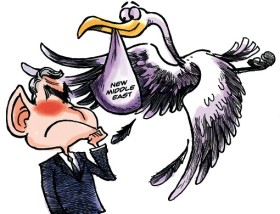The 'new Middle East' Bush is resisting

By Sa'ad Al Deen Ebrahim, Los Angeles Times-Washington Post News Service_
US President George Bush and Secretary of State Condoleezza Rice may be quite right about a new Middle East being born. In fact, their policies in support of the actions of their closest regional ally, Israel, have helped midwife the newborn. But it will not be exactly the baby they have longed for.
What is happening in the broader Middle East and North Africa can be seen as a boomerang effect that has been playing out slowly since the horrific events of September 11, 2001. In the immediate aftermath of those attacks, there was worldwide sympathy for the US and support for its declared "war on terrorism", including the invasion of Afghanistan. Then the cynical exploitation of this universal goodwill by so-called neoconservatives to advance hegemonic designs was confirmed by the war in Iraq.
The Bush administration's dishonest statements about "weapons of mass destruction" diminished whatever credibility the US might have had as liberator, while disastrous mismanagement of Iraqi affairs after the invasion led to the squandering of a conventional military victory.
Against this declining moral standing, President Bush made something of a comeback in the first year of his second term. He shifted his foreign policy rhetoric from a "war on terrorism" to a war of ideas and a struggle for liberty and democracy. Through much of 2005 it looked as if the Middle East might finally have its long-overdue spring of freedom.
Lebanon forged a Cedar Revolution, triggered by the assassination of its popular former prime minister, Rafik Hariri. Egypt held its first multi-candidate presidential election in 50 years. So did Palestine and Iraq. Qatar and Bahrain continued their steady evolution into constitutional monarchies.
But there was more. Hamas mobilised candidates and popular campaigns to win a plurality in Palestinian legislative elections and form a new government. Hezbollah in Lebanon and the Muslim Brotherhood in Egypt achieved similar electoral successes. And with these developments, a sudden chill fell over Washington and other Western capitals.
Now the cold war on Islamists has escalated into a shooting war, first against Hamas in Gaza and then against Hezbollah in Lebanon. Israel is perceived in the region, rightly or wrongly, to be an agent acting on behalf of US interests. Some will admit that there was provocation for Israel to strike at Hamas and Hezbollah following the abduction of three soldiers and attacks on military and civilian targets.
On July 30, Arab, Muslim and world outrage reached an unprecedented level with the Israeli bombing of a residential building in the Lebanese village of Qana, which killed dozens and wounded hundreds of civilians, most of them children. It is too early to predict whether Prime Minister Ehud Olmert will survive the recent war. But Hezbollah will survive, just as it has already outlasted five Israeli prime ministers and three American presidents.
Born in the thick of an earlier Israeli invasion, in 1982, Hezbollah is at once a resistance movement against foreign occupation. Despite access to millions of dollars in resources from within and from regional allies Syria and Iran, its three successive leaders have projected an image of clean governance.
In more than four weeks of fighting against the strongest military machine in the region, Hezbollah held its own and won the admiration of millions of Arabs and Muslims. People in the region have compared its steadfastness with the swift defeat of three large Arab armies in the Six-Day War of 1967. Hassan Nasrallah, its current leader, spoke several times to a wide regional audience through his own Al Manar network as well as the more popular Al Jazeera.
According to the preliminary results of a recent public opinion survey of 1,700 Egyptians by the Cairo-based Ibn Khaldun Centre, Hezbollah's action garnered 75 per cent approval, and Nasrallah led a list of 30 regional public figures ranked by perceived importance. He appears on 82 per cent of responses, followed by Iranian President Mahmoud Ahmadinejad (73 per cent), Khalid Meshal of Hamas (60 per cent), Osama Bin Laden (52 per cent) and Mohammad Mahdi Akef of Egypt's Muslim Brotherhood (45 per cent).
The pattern here is clear, and it is Islamic. And among the few secular public figures who made it into the top 10 are Palestinian Marwan Barghouti (31 per cent) and Egypt's Ayman Nour (29 per cent). None of the current heads of Arab states made the list of the 10 most popular public figures. While subject to future fluctuations, these Egyptian findings suggest the direction in which the region is moving. The Arab people do not respect the ruling regimes, perceiving them to be autocratic, corrupt and inept. More mainstream Islamists with broad support, developed civic dispositions and services to provide are the most likely actors in building a new Middle East. In fact, they are already doing so through the Justice and Development Party in Turkey, the similarly named PJD in Morocco, the Muslim Brotherhood in Egypt, Hamas in Palestine and, yes, Hezbollah in Lebanon.
These groups are not inimical to democracy. They have accepted electoral systems and practiced electoral politics, probably too well for Washington's taste. The rest of the Western world must come to grips with the new reality, even if the US president and his secretary of state continue to reject the new offspring of their own policies.
- Sa'ad Al Deen Ebrahim is an Egyptian democracy activist and a sociology professor at the American University in Cairo, Egypt.



Comments